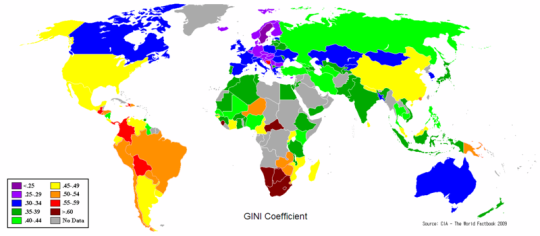
The Gini coefficient, a measure of wealth disparity, is one of those socioeconomic tools that the general public normally wouldn’t notice unless, oh, a country was publicizing its coefficient for the first time in 12 years. So it is in China, where officials on Friday announced that its index reached 0.474 in 2012 (with 0 representing complete equality and 1 representing one person with all the money).
We understand that 0.4 is already alarmingly high — “viewed by analysts as the point at which social dissatisfaction may come to a head,” according to Reuters — but some people in this country think 0.474 is actually a significant underestimation. Reports Didi Kirsten Tatlow for IHT Rendezvous:
Here are two lively reactions from microblogs, from a journalist and an economist who together have over six million followers:
“Please choose one: 1. Really, thank you Fatherland; 2. That’s a myth; 3. Not sure, but hurry up and increase my salary,” Shi Shusi, a journalist and social commentator, the director of the state-run Worker’s Daily Weekly, said on his Sina Weibo account to nearly 875,000 followers.
Xu Xiaonian, a professor of finance and economics at the China Europe International Business School, wrote on his Weibo account (5.5 million followers): “A journalist rang to ask me to comment on today’s macroeconomic figures. I’d have to be crazy to truthfully comment on false figures. That Gini coefficient, to use the words of Zheng Yuanjie,” a popular children’s story writer, “‘no-one would even dare to write a fairytale like that.’”
But is it progress that China even released its coefficient this year? “I believe it is a first step that reflects the new leadership’s more open approach and its desire to promote transparency,” Ma Guoxian of Shanghai University of Finance and Economics told SCMP. It indeed fits into the new administration’s plan (the skeptic would say “hopeful wish”) for transparency, that promised panacea. Or could it be that the government believes the figure will continue to decrease, as it says it did last year? Correction: that it believes it can, if necessary, make the figure decrease. Data is notoriously unreliable in China, after all — and never underestimate the narrative a group of statisticians can cook up when given a stock of numbers.

















































It took them 12 years to come up with a method to artificially lower the coefficient just so it could be at the same level of the USA. Also, I hate it when infographics use a scale that goes from yellow to green and then red. That doesn’t make any sense.
Oh, never mind. My bad on the scale thing.
*Pours self another coffee.
Colour me surprised/suspicious that India is doing so well.
Or maybe they’re all very poor and a certain 10-20% haven’t had the opportunity to enrich themselves as much as in China.
Does this take into consideration the amount of wealth in foreign/tax havens accounts, and properties owned e.g. by rich Chinese in foreign countries? If not, the entire exercise (not only re China) may have little sense.
A VERY easy way to tell if the numbers are fudged:
Does the Chinese government try to stop anyone else from collecting information and publishing an independently calculated Gini coefficient?
We all know what happens to the first expat that starts conducting an unauthorized survey. And it’s better treatment than what a Chinese national would get for doing the same.